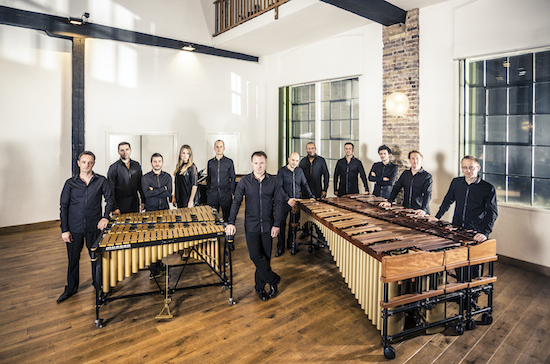The Colin Currie Group
Glancing around at an almost full, mostly masked, Royal Festival Hall, it feels great to be back here, or indeed anywhere, after the interminable lockdowns of the pandemic. It’s still early days for my own return to live music, so tonight’s premiere of a new piece by Steve Reich based around the ‘Tefilat HaDerech’ (Hebrew: תפילת הדרך) or the ‘Traveler’s Prayer’, seems potentially like a good omen for the return of international travel and the cross-pollination of musical ideas that goes with it.
Sadly Reich himself isn’t present tonight, although one can hardly blame him. He has recently celebrated his 85th birthday and the UK is currently a frontrunner among European nations for coronavirus cases. As the opening speech by Toks Dada, the Southbank’s Head of Classical Music, makes plain however, the new piece, written during lockdown, is nevertheless an international collaboration at least in spirit, commissioned by organisations in Amsterdam, Paris, Hamburg, Tokyo, Berkeley, California and, of course, London. London itself has special significance, as the scene of the meeting, a decade ago on this very stage, of Reich and future collaborator Colin Currie, whose group perform the pieces tonight, along with Synergy Vocals.
Reich began work on the ‘Traveller’s Prayer’ prior to the onset of the pandemic, and found that "the virus shifted the gravity of the words" he was setting. Traditionally recited before embarking on a journey – be it by land, sea or air – it can also be used as a blessing for those embarking on a journey from this world to the next. The piece utilises two pairs of vocalists, one pair male and one pair female, combining a melody from a Biblical chant used in America and parts of Europe with a more elaborate style from Italy, and a third based on the inferred Biblical accents in the texts.
As Reich himself has stated, unusually for him, this is a piece without an identifiable beat. Both the new piece and the one which preceded it, ‘Runner’, run to 16 minutes, but define their duration by entirely different internal mechanisms. Although I find myself pining for the presence of Reich’s trademark pulse during ‘Traveller’s Prayer’, the piece nevertheless attains a singular beauty, tinged with melancholy. The interplay of voices and the long, sustained tones of stringed instruments produce a sombre, reflective mood which still manages to shine brightly as it resonates in the wonderful acoustics of the RFH. As an audience member behind me notes to his friend, the piece recalls the work of the Estonian composer Arvo Pärt, more than anything else in Reich’s oeuvre.
Next up after a short break, Quartet is the highlight of the evening. Gorgeous from the onset of the very first notes, there’s something immensely satisfying in the two-vibraphone, two-piano set-up, both visually and sonically. The simple motif that begins the piece evolves naturally through its varying iterations, with seemingly endless capacity to delight and enchant. Judging from the audience’s response at the end of the piece, I’m not alone in thinking that kaleidoscopic, pulsating tunes like this are what Reich does best. Closing the show, ‘Tehillim’ has its own delights to offer, primarily the incredible illusion of celestial choral voices perpetually rising, cascading and rising again, as if inscribing the sign of infinity and leaving behind traces of its melody long after I’ve left the auditorium.
The musicians are on perfect form and Colin Currie’s enthusiasm as conductor is a joy to behold. Reich’s music has an undeniably effervescent spiritual quality that crosses all kinds of boundaries, both the secular and the sacred, as well as the divisions between different kinds of music that sometimes define listeners as apart from one another. For all that he has already accomplished and whatever he chooses to do next, we are lucky to have him.


